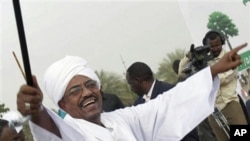A prominent member of Sudan’s governing National Congress Party (NCP) told VOA the renewal of U.S. trade sanctions will not negatively affect President Omar Hassan al-Bashir’s government insisting Khartoum is “accustomed [to] and immune” from the sanctions.
Rabie Abdelati Obeid said the sanctions are yet another demonstration of what he described as America’s arrogance and dictatorial tendencies towards the government in Khartoum.
“I don’t think these sanctions have any justification except that it will only prove that it is oppression by the United States administration," sais Obeid. "It also shows that the American administration did not acknowledge the sovereignty of Sudan.”
Obeid said Washington’s renewed sanctions are regrettable.
“[The] United States involved herself in an internal issue of Sudan. And, I think, that this is a very serious intervention in a domestic issue and also shows the arrogance of the American administration. I also do not think that this will help for the smooth running of the upcoming referendum, which should be carried out in the beginning of the year 2011,” Obeid said.
This came after Washington renewed trade sanctions for another year, but says they could be re-evaluated after January's independence referendum in the semi-autonomous south Sudan.
In a letter to Congress, President Barack Obama wrote that the conditions that warrant the sanctions, Sudanese support for terrorism and its complicity in violence in the Darfur region, have not be resolved.
He calls Sudan's actions and policies an extraordinary threat to American security and foreign policy. But, U.S. officials say the sanctions would be reviewed if the Sudanese government takes a cooperative approach to two separate January referendums on the country's future.
Obeid said the renewed sanctions against Khartoum are not a good sign of cooperation from Washington.
“I can say that this will be considered as biased of the United States of America towards the south more than showing justice [towards the north]. And, this will not be acceptable by the Sudan government and it will not be accepted by the free people of this world,” Obeid said.
He further said that the sanctions will not have any negative impact on Sudan’s economy.
Voters in south Sudan are to decide if the area becomes independent or remains part of Sudan. The oil-rich Abyei region will also vote on whether it stays in Sudan or joins an independent south Sudan.












